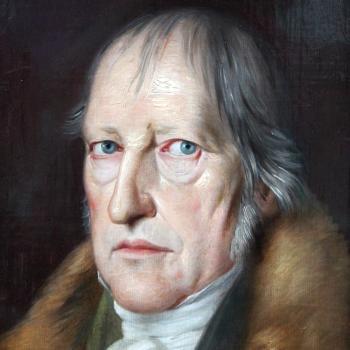Lectionary Reflections
1 Kings 19:1-4, 8-15a
June 23, 2013
Today we read a story that ends the first cycle of Elijah stories in the book of 1Kings. In 1 Kings 17 the power of the prophet is demonstrated as he provides in miraculous fashion an unlimited supply of food for the distraught widow of Zarephath, and even more astonishingly raises her dead son to life. I spoke two weeks ago about the problems I find in these tales of supernatural acts, how they focus our attention too much on empty arguments about whether such things can happen in real life. Believers over the centuries and right up to the present have divided sharply over such claims, though proof on either side is scarce as hen's teeth.
I will argue here that such debate is fruitless and frivolous. How do I know? Because the Bible tells me so! Once 1 Kings 19 is put into its proper literary context, the discussion about the possibilities of prophetic and magical power seems wholly beside the point. The real question, as it always is, is just what sort of God is this who comes to Elijah and to us? 1 Kings 19 provides to us one of the Bible's richest answers to this vital question.
After Elijah shows the widow and her son just how potent he can be in 1 Kings 17, he then confronts the massive prophetic forces of Jezebel, Ahab's queen, on Mount Carmel. In a wonderfully dramatic encounter, YHWH's prophet bests the 450 prophets of the Baal in a sacrificial head-to-head smackdown. Elijah politely gives the Baal boys first crack at solving the problem of drought in the land. They proceed to offer a bloody sacrifice, first of an animal and then some of their own blood, in the loud attempt to coerce a few drops out a clear blue sky. But even after an all morning cutting and dancing ritual, the sky remains dry and silent. Elijah has a high sarcastic time watching these priest/prophets work themselves into exhaustion to wring something from their gods. He shouts at them that perhaps Baal is on retreat, or has wondered off somewhere in confusion, or has taken a trip to some more pleasant place, or maybe is just tired and is napping (1 Kgs. 18:27). I am very sorry to say that the KJV translation that Baal has "turned aside," meaning that he is urinating, is not linguistically possible. Too bad!
After Elijah's high-handed fun with the panting priests, he lays his own altar, utters a short prayer to YHWH, and out of the cobalt sky falls torrents of rain, so much rain, accompanied by such a firefall of lightning, that the altar is burned away, including the stones, the wood, the dust, and all the water that Elijah has poured into the trenches all around (1 Kgs. 18:38). Upon seeing all this, the witnesses scream out, "YHWH is God! YHWH is God!" Well, who wouldn't? The Super Bowl of prophecy has been won by Elijah. Who wouldn't tear down the goalposts of the winning team? Then, in a rapture of bloody violence, Elijah, prophetic champion, demands that these people grab all 450 prophets of Baal and drag them down to the wadi Kishon, now roaring with the water of YHWH. And there, clearly not commanded by YHWH, Elijah slaughters each prophet personally.
If the tale ended there, Elijah would be carried off on the shoulders of the Israelites and declared king or leader. I hope he would have cleansed his blood-filled hands sometime before the day of his coronation. Surprisingly, that is not at all how the story continues. Jezebel, always less than a shy retiring violet of a woman, hears of this butchery at Kishon, and orders that Elijah join her priests in death ASAP. Suddenly, Elijah finds himself alone, alone so soon after his display of prophetic power, alone so soon after he was about to be crowned or raised to public power. It turns out that all the evidence of power that Elijah shows finally means very little; all it has got him is a death sentence and the quick desertion of all those who claimed to be devotees of YHWH. Miracles are like that; they do not provide solid foundations for ongoing faith. Just ask Jesus. In the light of any number of amazing acts of power, the disciples and the people can never seem to find enough there to convince themselves that Jesus is somehow uniquely related to his God. He ends up alone and under sentence of death, too.
Elijah runs for his life toward the southern deserts of Beersheba, traditional boundary of Israelite territory. But he then heads even one more day's journey into the silent wilderness, completely alone. He is fed there by angels, and after that sustenance he walks for forty days and nights toward the sacred mountain of YHWH, Horeb in this tradition, though other writers know it as Sinai (1 Kgs. 19:3-8). At the mountain he finds a cave in which to spend the night. Suddenly, YHWH speaks: "What are you doing here, Elijah?" There are multiple ways that one might hear this question; it all depends on where you place the emphasis in the sentence. The simplest meaning may be: "I am surprised to see you, Elijah. I did not expect you of all people to show up on my mountain." That would emphasize the "you." But if you focus on the "here," it could imply that Elijah should not be here at all, but somewhere else.





